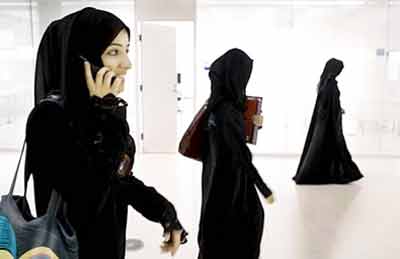
Most UAE employees prefer wi-fi for mobile connectivity
Dubai, June 28, 2014
Majority of the employees across the UAE (75 per cent) prefer wi-fi for mobile connectivity at the expense of other connections (4G, 3G or wired), said a new survey.
It is therefore most important for organizations to build stronger Wi-Fi networks, stated the recent research conducted by Aruba Networks in emirates as part of a larger global survey involving more that 5,000 respondents, on the enterprise mobility trend.
Ammar Enaya, the regional director at Aruba Networks, Middle East & Turkey said that while remote working was certainly in demand in the UAE, the concept of traditional offices and working hours will still exist.
"The focus on a more flexible work environment is mainly driven by knowledge workers - industries such as the financial and professional services are leading the way in this transition. But the likes of healthcare and retail will continue to require more traditional workplaces, for obvious reasons," noted Enaya.
So what does this suggest about the workplace of the future? It indicates it will be one in which employees have complete flexibility to access information and collaborate, and where business processes become increasingly automated.
This means employers in UAE will need to shift their thinking on the concept of the workplace to one that meets the needs of the mobile workforce. Those who offer the conditions sought after by this segment (dubbed #GenMobile by Aruba Networks), are more likely to attract and retain the best talent. And more importantly, of course - satisfied employees make for productive employees, said the report.
IT departments in UAE can create rock-solid Wi-Fi foundations by following these easy steps:
Put Wi-Fi everywhere: The defining aspect of #GenMobile is that these employees connect from all locations all the time, and prefer Wi-Fi over other connectivity options. Clearly, the hotspot model of deploying Wi-Fi only in areas where people traditionally congregate will no longer work. IT departments need to plan for network access in every corner, from board rooms to locker rooms and elevators.
Manage interference: Interference is a fact of life, but poor performance doesn't have to be. Maximizing performance requires a WLAN that constantly scans the Wi-Fi spectrum for interference and self-heals within seconds of finding a problem.
Plan for crowds: Today, each member of the #GenMobile crowd carries an average of three mobile devices. By 2015, ABI research predicts that there will be 18.8 billion Wi-Fi enabled devices worldwide! So networks need to be built with the stability and performance to handle lots of connected devices.
Deal with sticky clients: Most smartphone users suffer from sticky client syndrome. That is, a smartphone connects to the first AP it encounters and stays connected, even if the user roams closer to another AP.
That means that an iPhone stays connected to the lobby AP even though it has moved upstairs and is now at the employee's desk. This is bad for the employee and bad for the rest of the network that might be waiting for the device to complete upload on a slow link.
Utilizing a smart Wi-Fi solution which automatically moves devices to the appropriate AP helps overcome this difficulty, said the study by Aruba.
In short, employers in the UAE need to put ample mobile measures in place for #GenMobile, and soon - or risk scaring away future talent. With flexible and remote working such a top priority, and the traditional ‘productive’ working hours slipping away, organisations need to improve their mobile credentials, and close the #GenMobile gap, the it added.-TradeArabia News Service







